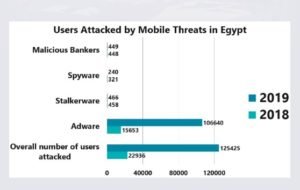Mobile malware detected in Egypt boomed within 2019,
seeing an unprecedented 447% increase in the number of attacked users compared to 2018, according to Kaspersky researchers.
The overall number of users attacked reached125,425. In particular,
Mobile Advertising Trojans witnessed a solid rise in 2019, increasingly jeopardizing the personal data of smartphone users. Itaccounts for around85% of all users attacked through phones in the region, increasingly jeopardizing the personal data of smartphone users.
These are among the major findings of the annual “Mobile Malware Evolution” report.
Amid growing concerns about digital privacy over the last few years – which has led to increased regulation as well – we often tend to forget the mobile aspects of the issue. However,
in the hyper-connected world of today,
users are always in touch and online, be it on mobile email applications, social networks, or various messengers.
Mobile devices have turned into transportable containers of personal data.
It is no surprise then that malicious hunters for private information have decided to exploit this.
As Kaspersky statistics demonstrated,
two of the most actively evolving mobile threats of 2019 have a lot to do with threats to privacy – namely mobile adware and spyware.
The former collects troves of private information to show users targeted banner ads.
Apart from the usually annoying banners,
there is another dimension to this type of attack– victim’s sensitive data may end up on third-party servers without consent or knowledge.
In the past year, 106,640usersin Egypt were attacked with Adware.
The latter iscommercial spyware, a relatively new threat, usually installed on devices without users’ knowledge or consent;
they stay hidden, operating in the background.
These applications have access to significant amounts of personal data,
such as device location, browser history, text messages, social media chats, photos and more.
They not only share sensitive information with an abuser,
but there is also room for a third-party hacker to gain access to stalkerware servers and collect all of this information for their own purposes.
In 2019 the number of users targeted by stalkerwarereached 466.
While this number may seem insignificant compared to adware,
one must keep in mind that unlike any other threat mentioned earlier,
spyware and stalkerware take a more targeted effort to affect a victim. It requires a specific stalker or attacker to act and carry out its operation.
Globally, Stalkerware is of growing interest to malicious users.
Kaspersky latest stats, calculated using the stalkerware detection criteria suggested by the Coalition AgainstStalkerware,
show that attacks on the personal data of mobile device users increased from 40,386 unique users attacked in 2018 to 67,500 in 2019.
Moreover, there was a twofold increase in the number of attacks during the second half of the year when compared to the first half.
For example, there were 4483 users attacked in January 2019; in September 2019, this number rose to 9546, and, in December 2019,
this number reached 11052 attacked users.
“In 2019, attacks by stalkerware,
which aims to track the victim and collect private information about them, became much more frequent. What is even more important,
the technical development of this type of attack does not lag behind its malicious counterparts. Given that,
we would like to reiterate that digital privacy is just as much a person’s right as any other. And there are ways to keep personal data safe and secure.
But to do so, it is very important to treat this issue with care,
” commentsVictor Chebyshev, security expert at Kaspersky.
To reduce the risk of infection and to stay protected,
Kaspersky experts advise:
• Pay attention to the apps installed on your device and avoid downloading them from unknown sources
• Always keep your device updated
• Regularly run a system scan to check for possible infections
Kaspersky also recommends that users install a reliable security solution like Kaspersky Total Security on their device,
which aims to protect users’ privacy and personal information from mobile threat
s. The service also checks whether your privacy has been compromised using the “Account Check” function.
Read more about the evolution of mobile threats in 2019 on Securelist.com
About Kaspersky
Kaspersky is a global cybersecurity company founded in 1997. Kaspersky’s deep threat intelligence and security expertise is constantly transforming into innovative security solutions and services to protect businesses,
critical infrastructure,
governments and consumers around the globe.
The company’s comprehensive security portfolio includes leading endpoint protection and a number of specialized security solutions,
and services to fight sophisticated and evolving digital threats.
Over 400 million users are protected by Kaspersky technologies and we help 270,000
corporate clients protect what matters most to them.

 التكنولوجيا وأخبارها بوابة مصر لأخبار تكنولوجيا المعلومات والإتصالات
التكنولوجيا وأخبارها بوابة مصر لأخبار تكنولوجيا المعلومات والإتصالات







